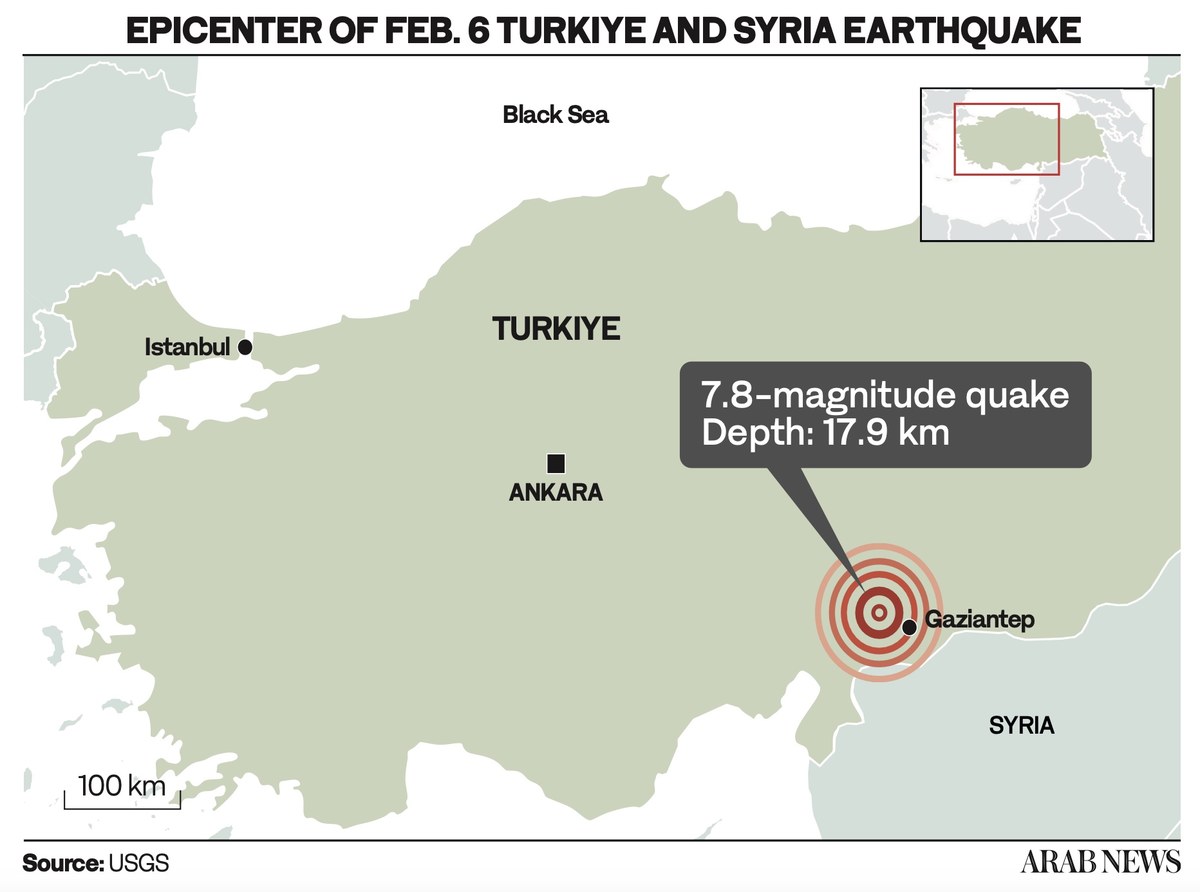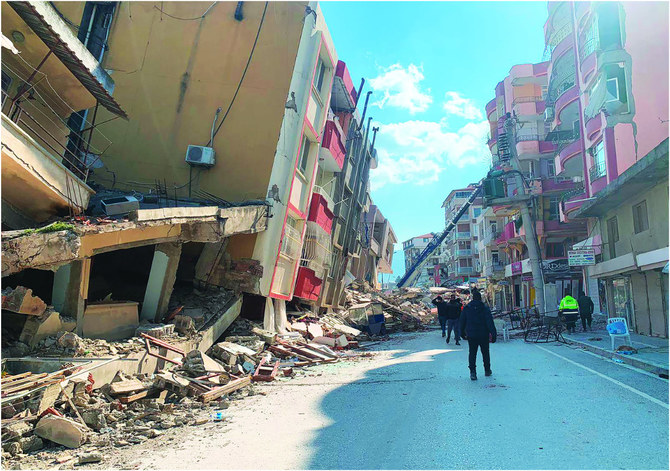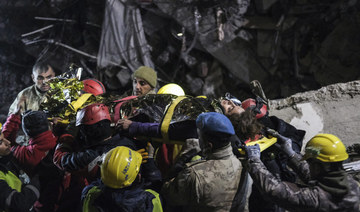ANKARA: Baris Yapar managed to escape from his building when the first massive earthquake struck southeast Turkiye in the early hours of Monday. His grandparents were living just a short distance away, but when he reached their building, he found only rubble.
“We waited the whole night. We made several calls, but no one came to help,” Yapar told Arab News near his home in the Samandag district of Hatay province.
“After 40 hours, we rented the necessary equipment to open some parts of the wreckage ourselves.”
The period immediately after an earthquake is considered the most critical for search-and-rescue efforts. But as roads in the disaster zone were blocked or badly damaged by the quakes, rescue teams struggled to reach the devastated areas.

Turkish rescuers work to pull out a middle-aged man from a collapsed building in Hatay on Feb. 11, 2023, five days after two earthquakes hit Turkiye and Syria. (AP)
After 60 hours, using only basic machinery and their bare hands, Yapar and other residents were able to save their relatives from the mountain of rubble. His grandparents did not survive.
“We couldn’t find any ambulances or funeral vehicles after we pulled my grandmother and grandfather out from their collapsed building,” said Yapar.
“We carried them in our trunk until the mortuary. We then came the other day to find their corpses among hundreds of others. We finally found them and carried them to the cemetery in our car to bury them.”
Almost a week after Monday’s devastating twin earthquakes, rescue teams are still searching through the rubble of towns and cities in southeast Turkiye despite fading hopes of finding further survivors.

Rescuers carry Muhammed Alkanaas, 12, to an ambulance after they pulled him out five days after the Monday earthquake in Antakya, southern Turkiye, on Feb. 11, 2023. (AP)
Around a quarter of the 166,334 rescue workers deployed to the field have come from abroad. While there is a sliver of hope of finding anyone alive under the debris, search operations are expected to continue.
As of Saturday night, Turkish authorities say at least 21,848 people have been killed and around 80,104 injured. Combined with the 3,553 killed in neighboring Syria, the total death toll has now passed 25,000.
Turkiye, which sits on a series of major fault lines, has experienced several major earthquakes in recent years. However, Monday’s quake, triggered by movement in the East Anatolian fault, is considered the nation’s most devastating since 1939.
Traumatized survivors remain on edge, wary of returning to their homes, as minor tremors have continued throughout the week. Seismologists have detected around 1,972 aftershocks since Monday.
Although it has been several days since the magnitude 7.8 earthquake struck, followed by a magnitude 7.5 quake just hours later, rescue teams from various countries are miraculously finding survivors among the wreckage. One 4-year-old girl was rescued in Gaziantep after being trapped for 131 hours.

On Friday, at around midnight local time, an Israeli team rescued a 9-year-old boy in Kahramanmaras after an operation that lasted 36 hours. He had survived under the rubble for 120 hours. Another 10-year-old boy was saved in the same city on Friday morning.
However, dramatic rescue stories such as these are becoming increasingly rare, as fewer people are found alive. Silence increasingly falls over the mass of debris, where copies of the Qu’ran, family photos, broken toys and kitchenware are strewn among the shattered masonry.
While recovery workers sift through the rubble, families are often seen huddling beside their wrecked homes, waiting to take possession of the bodies of their loved ones.
Bengi Baser, a Turkish cardiologist, visited quake-hit Hatay on Friday as part of an aid convoy.

Turkish Dr. Bengi Baser helps distribute medicines and relief goods at an evacuation camp in Hatay on Feb. 11, 2023. (Supplied)
“With a large group of medics, we visited the Armutlu and Defne districts of Hatay. I noticed that there is a strong civil initiative in the region for rescuing people, but there is significant disorder when it comes to distributing humanitarian help,” Baser told Arab News.
Hatay residents who spoke to Arab News said there were not enough tents to shield displaced families against the elements. Those tents that had been provided were not suitable for the freezing conditions.
“It is impossible to sleep in the tents when the outside temperature is -4 degrees Celsius during the nighttime,” said Baser. “People are standing around a fire, but children are extremely sick because they are freezing outside.”

Rescuers face mountains of rubble and impassable roads in Turkish towns destroyed by the quake. (Supplied)
The collapse of local infrastructure is also a major concern for those with chronic illnesses that require treatment, such as diabetics, cancer patients, and those in need of dialysis. Indeed, the earthquakes have been devastating for people of all social backgrounds.
“I met a woman in Hatay’s Defne district. She was a survivor of the earthquake. She said that her family was the richest one in the region, and now she is homeless. There is an increased awareness about the precariousness of life,” said Baser.
The medical group that Baser arrived with brought a large number of coffins, donated by a firm in the northwestern province of Bursa. With so many dead, it is essential the bodies are buried quickly, in line with religious beliefs, and also to prevent disease.

People stand next to the bodies of earthquake victims outside the state hospital in Hatay, Turkiye, on Feb. 8, 2023. (Reuters)
“Corpses are lying on the streets. Relatives are waiting for the arrival of the forensic doctors and prosecutors. It is likely that they will be buried in mass graves because some thousands had been buried in just two days,” said Baser.
A large graveyard is now under construction on the outskirts of Antakya, the capital of Hatay province, as a growing number of body bags arrive in the city from surrounding districts.
Many Antakya residents are now sleeping outdoors after the earthquakes left their homes uninhabitable. With a lack of water, hygiene and sanitation services, many are concerned illness will soon spread.

People sleep amid rubble and damages in Kirikhan, Turkiye, on Feb. 9, 2023, in the aftermath of the February 6 earthquakes. (Reuters)
“There are no common toilets,” said Baser. “We urged some municipalities to send mobile toilets to the region. Diarrhea is common among children, and it is a real public health risk.”
There has also been public anger against construction firms, several of which are alleged to have ignored government regulations introduced in 2018 that demand all new buildings be reinforced with additional steel beams to help them withstand tremors.
Bekir Bozdag, Turkiye’s justice minister, said this week that anyone found to have neglected the building regulations will be prosecuted. Twelve people have been detained over collapsed buildings in Gaziantep and Sanliurfa, local news media reported on Saturday.

Aerial photo showing the destruction in Hatay city center in southern Turkiye. (IHA via AP)
For now, Yapar and his surviving family in Samandag must make do with what they can salvage from their home and try to rebuild their lives in the midst of Hatay’s battered infrastructure.
“We still don’t have heaters and bottled gas. There is no mobile toilet in the district,” he told Arab News.
There are also security concerns, as looters take advantage of the chaos. Turkish authorities have arrested 48 people over looting, state media outlet Anadolu reported on Saturday.
“For a couple of days, there has been an increasing trend of looting,” said Yapar.
“Police forces are deployed in each city to prevent them. People are feeling tired and panicky. They are concerned that their houses could be looted if they are not around.
“We still cannot stay at home because it is partly damaged. We only go in for a limited time, then go back out.”

















